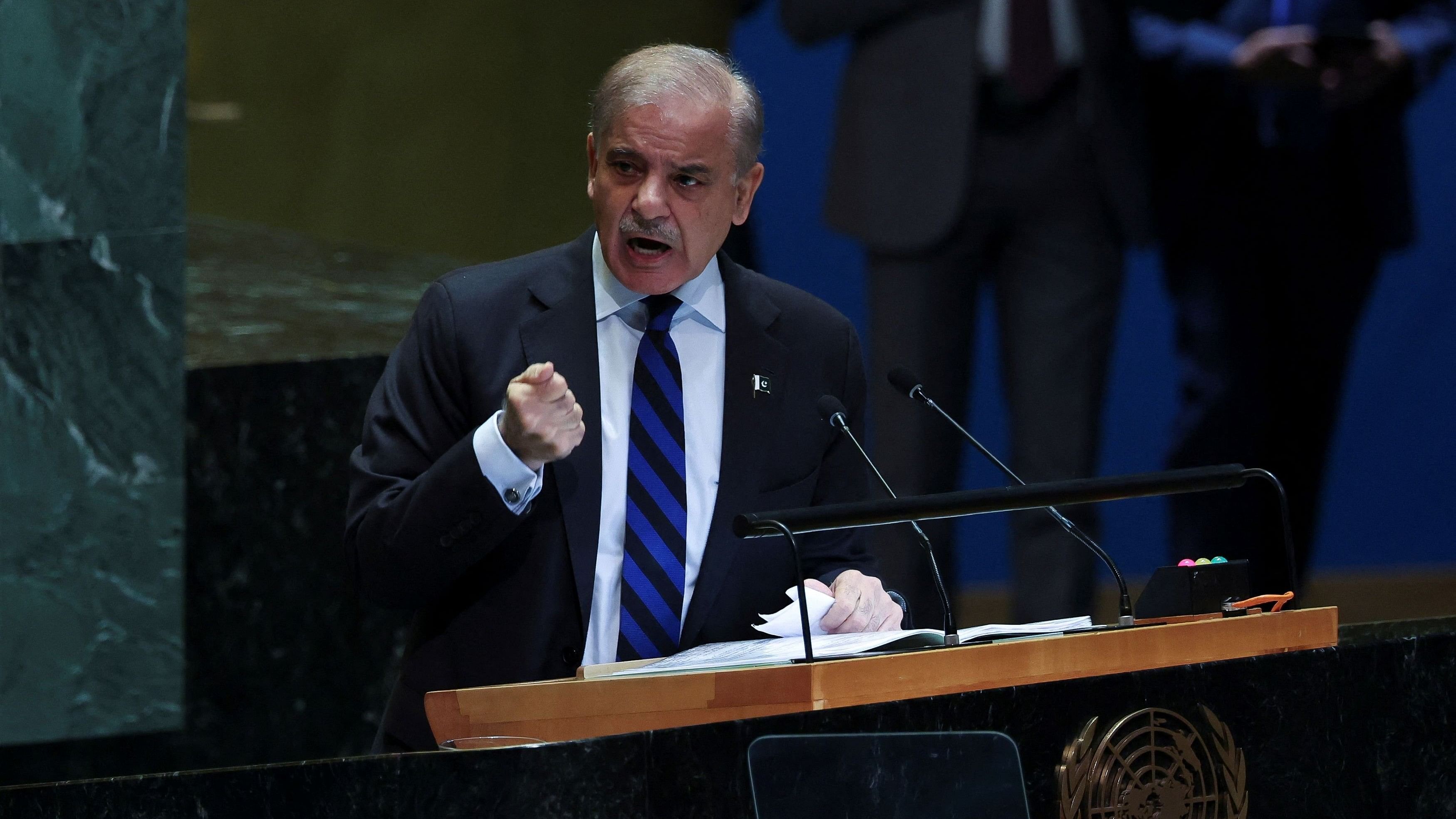
Pakistan's Prime Minister Shehbaz Sharif addresses the 79th United Nations General Assembly at U.N. headquarters in New York, U.S., September 27, 2024.
Credit: Reuters Photo
United Nations: Pakistan on Friday raised the Kashmir issue in the UN General Assembly, saying that to “secure durable peace”, India should reverse the Abrogation of Article 370 and enter into a dialogue for “peaceful” resolution of the Jammu and Kashmir issue.
Pakistan Prime Minister Shehbaz Sharif, in his address at the General Debate of the 79th session of the UN General Assembly, raked the issue of Jammu and Kashmir as expected, making references to Article 370 and Hizbul terrorist Burhan Wani in his over 20 minute speech.
Sharif spoke at length about Kashmir saying that “similarly, like the people of Palestine, the people of Jammu and Kashmir too, have struggled for a century for their freedom and right to self-determination”.
Referring to India’s decision to abrogate Article 370, Sharif said, "to secure durable peace, India must reverse the unilateral and illegal measures” of August 2019 and enter into a dialogue for a peaceful resolution of the Jammu and Kashmir issue in accordance with the UN Security resolutions and "wishes of the Kashmiri people".
Sharif alleged that instead of moving towards peace, India has moved away from its commitments to implement the Security Council resolutions on Jammu and Kashmir. “These resolutions mandate a plebiscite to enable the people of Jammu and Kashmir to exercise their fundamental right to self-determination,” he said.
The Pakistan prime minister further said that escalation of Islamophobia is a troubling global development. “The most alarming manifestation of Islamophobia is the Hindu supremacist agenda in India. It aggressively seeks the subjugation of 200 million Muslims and the obliteration of India's Islamic heritage,” he alleged.
India was expected to issue a strong rebuttal to Pakistan's allegations through a Right of Reply after the debate concluded.
Pakistan regularly raises the issue of Jammu and Kashmir at various UN platforms, irrespective of the subject matter being discussed or the theme of the forum and fails to get any support or traction.
New Delhi has repeatedly emphasised that Jammu and Kashmir and Ladakh were, are and will always be an integral and inalienable part of India.
India has also asked Pakistan to concentrate on addressing its internal matters rather than raising the Kashmir issue and indulging in frivolous allegations against New Delhi.
Tensions between India and Pakistan spiked after New Delhi abrogated Article 370 of the Constitution to revoke the special status of Jammu and Kashmir on August 5, 2019.
Sharif also spoke about the situation in Gaza, Ukraine and Afghanistan. “Today, we are facing the most daunting challenges to the world order. Israel's genocidal war in Gaza, a dangerous conflict in Ukraine, destructive conflicts across Africa and Asia, rising geopolitical tensions, resurging terrorism, galloping poverty, stifling debt and the mounting impact of climate change,” he said.
On the Gaza war, Sharif said, “This is not just a conflict. This is systematic slaughter of innocent people of Palestine...we must act now and demand an immediate end to this bloodshed.”
He said Pakistan seeks an “immediate end" to the “tragic conflict” in Ukraine and its peaceful resolution in accordance with the UN Charter and international agreements.
Sharif said Pakistan seeks the earliest possible normalisation of the situation in Afghanistan and the “interim government” must take effective action to "neutralise all terrorist groups within Afghanistan", especially those responsible for cross-border terrorism against neighbouring countries. These include ISIL-K, Daish, Al Qaeda associated Tehrik-e Taliban Pakistan (TTP) and other terrorist groups, which “unfortunately" are seen on Afghan territory, he said.